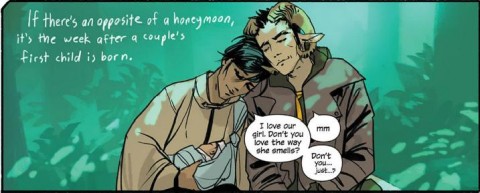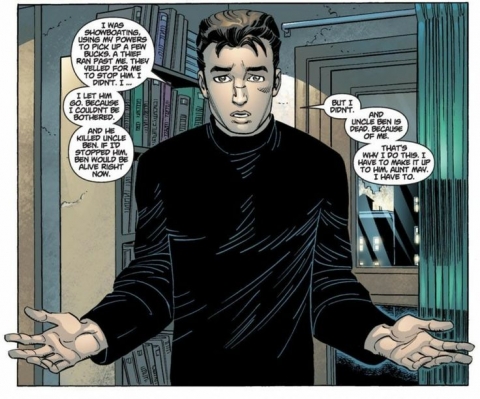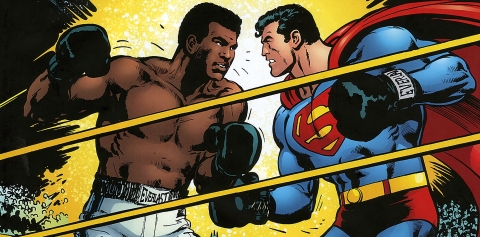52 weeks. 52 different writers. 2 trade paperbacks or hardcovers a week. Each week I’ll take a look at a different writer and read two different collected editions from within that person’s repertoire to help in the examination of their work.
Brian K. Vaughan, much like the rest of the world, is a man with opinions. Like any good writer, Vaughan uses his work to share his opinions sometimes. Enter Ex Machina, a political superhero drama about a man who retires from superheroics to become the mayor of New York City. With Ex Machina, Vaughan sought to tackle tough political situations and express his view on some of them. Vaughan is a large advocate of doing creator-owned work in comics, feeling as though that is where he does his strongest work. After turning in the final script for Ex Machina, Vaughan stated, “I realized when I turned in this final Ex Machina script that it would be the first time I wasn’t under some kind of deadline at Marvel or DC since 1996. That’s a huge chunk of my life to spend with those characters. I love them, and I still read Marvel and DC’s superhero books. I just think I’m better when I’m working on my own creations. When there are so many talented creators out there who are better at that stuff than me, I should leave those characters to them. I should do what I’m fortunate enough to be in the position to do, which is to create more new stuff.”
Ex Machina Book One
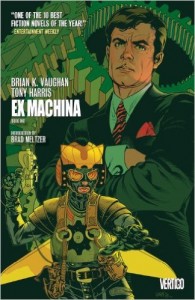 Mitchell Hundred became the world’s first, and only, living breathing superhero following a freak accident that leaves his life forever changed. A civil engineer, Mitchell is called out to examine a strange glowing object lodged into the base of the Brooklyn Bridge. When the object explodes in his face, and takes half of it with it, Mitchell is suddenly given the power to talk to all sorts of machinery. Using this power, Mitchell becomes “The Great Machine”, taking on vigilantism with his new-found powers. After realizing he is becoming more of a nuisance to the legal system than he is being helpful, Mitchell decides to hang up his gear, out himself as “The Great Machine” and run as mayor for New York City. In the wake of a horrible, American tragedy, Mitchell becomes the mayor by a landslide victory. Now the mayor, Mitchell must juggle political scandals with the backlash that comes with being the only human on Earth with these exceptional abilities.
Mitchell Hundred became the world’s first, and only, living breathing superhero following a freak accident that leaves his life forever changed. A civil engineer, Mitchell is called out to examine a strange glowing object lodged into the base of the Brooklyn Bridge. When the object explodes in his face, and takes half of it with it, Mitchell is suddenly given the power to talk to all sorts of machinery. Using this power, Mitchell becomes “The Great Machine”, taking on vigilantism with his new-found powers. After realizing he is becoming more of a nuisance to the legal system than he is being helpful, Mitchell decides to hang up his gear, out himself as “The Great Machine” and run as mayor for New York City. In the wake of a horrible, American tragedy, Mitchell becomes the mayor by a landslide victory. Now the mayor, Mitchell must juggle political scandals with the backlash that comes with being the only human on Earth with these exceptional abilities.
Ex Machina is, in my mind, one of the more brilliant and politically thought-provoking superhero stories that I’ve read. It’s a comic that has a clear superhero as its lead but beyond that it does well to stray itself far from the superhero genre to tell a story that will leave you absolutely salivating for more to come. Brian K. Vaughan writes this political superhero comic in a way that not only engages your mind but leaves you feeling anxious for the always struggling Mitchell Hundred, a man woefully unprepared for the responsibilities he takes on in becoming the mayor of New York City. It is simply stunning to see the level of anxiety Brian K. Vaughan instills in you as a reader through the trials that Mitchell faces, all the while acknowledging from the opening pages of this comic, that this story is nothing if not a tragedy. In knowing that, you sit with a bated breath the entire time, waiting for Vaughan to slip in a fatal blow that will spiral this story out of control, but instead Vaughan takes his time with the slow demise of Mitchell, making you fall in love with the character before he inevitably pulls out the rug from underneath him far down the road.
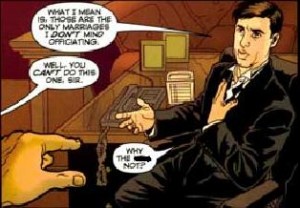 Let’s talk about Mitchell for a second. Mitchell Hundred is the stereotypical image of what you see Mayors, Senators, or even sometimes Presidents portrayed as within fictional media. He is charismatic, brave, slightly brash but largely likeable. There is just something to Mitchell’s personality that draws you in. Even though from the first pages of this comic he tells you that his story will be that of a tragedy, you can’t help but love the character. As you watch Vaughan work him over to you, watch him struggle and succeed, making decisions that spit in the faces of people who oppose him but still come off as a kind man, you can’t help but believe there is no way this man’s story ends poorly. He comes off as not too much of a saintly figure, but he is portrayed enough as a man of strong morals and conviction that no matter what, you just have to believe he’ll come out of this okay and as a better man in the end. Vaughan even gives you glimpses of the demons that plague him, failing to be the hero he needed to be when the time called for it, yet you still root for him. Mitchell isn’t the most compelling character to ever grace comics, nor wholly original, but he is a character that you have to love even though you know at some point he is going to fail and that is all thanks to the work Brian K. Vaughan puts in to get this character across to you.
Let’s talk about Mitchell for a second. Mitchell Hundred is the stereotypical image of what you see Mayors, Senators, or even sometimes Presidents portrayed as within fictional media. He is charismatic, brave, slightly brash but largely likeable. There is just something to Mitchell’s personality that draws you in. Even though from the first pages of this comic he tells you that his story will be that of a tragedy, you can’t help but love the character. As you watch Vaughan work him over to you, watch him struggle and succeed, making decisions that spit in the faces of people who oppose him but still come off as a kind man, you can’t help but believe there is no way this man’s story ends poorly. He comes off as not too much of a saintly figure, but he is portrayed enough as a man of strong morals and conviction that no matter what, you just have to believe he’ll come out of this okay and as a better man in the end. Vaughan even gives you glimpses of the demons that plague him, failing to be the hero he needed to be when the time called for it, yet you still root for him. Mitchell isn’t the most compelling character to ever grace comics, nor wholly original, but he is a character that you have to love even though you know at some point he is going to fail and that is all thanks to the work Brian K. Vaughan puts in to get this character across to you.
Vaughan meticulously builds a supporting cast around Mitchell, choosing to spend these first eleven issues creating allies instead of developing enemies, further hammering home the idea that Mitchell is in fact the largest threat unto himself. Every other character that Vaughan introduces serves some form of purpose to Mitchell’s life, choosing to still include two primary characters from his past but also shaking it up and having the new people in his life due to his mayor campaign be far more at the forefront. Vaughan really wants to get across the idea that the most important part to the story now isn’t Mitchell’s past but his future and having characters like Dave Wylie, Journal Moore, and Candice Watts be more accessible to the reader. Dave Wylie is Hundred’s deputy mayor, oft dealing with the backlash of Mitchell’s actions. It puts the two good friends into adversarial positions sometimes but both men have cooler heads that tend to prevail. Journal Moore is a young beautiful intern who gets a quick promotion, something Mitchell is urged against giving due to it coming off as scandalous. Moore is a youthful character, as evidenced by her new job position of “Special Advisor on Youth Affairs”. Candice Watt is the fourth Chief of Staff for the Mitchell administration, after the previous three quit after only two weeks. The new Chief of Staff comes off as a whip-smart character, Candice is fast on the ball and can be rather clever with the way she replies to Mitchell’s sometimes cocky demeanor.
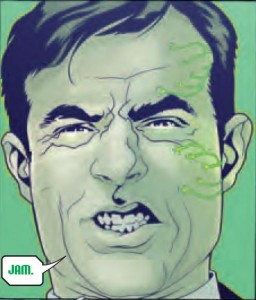 Although these few characters are at the front of the story, since it is told through the perspective of the present time, there are still a few characters that factor into the story heavily from the past. Rick Bradbury, Kremlin, and Jackson Georges are all characters from Mitchell’s past, during his time as “The Great Machine”, who heavily factor into the past timeline whilst also playing some factor in the present day narrative. Rick Bradbury is actually the only one out of the three men mentioned who becomes part of Mitchell’s administration, being given the job of Head Of Security by Mitchell. The two men are close friends and Bradbury is someone who Mitchell can always confine in. The two men’s tight friendship reaches back to Mitchell’s accident that gave him powers, bringing them even closer together during Mitchell’s time as the vigilante, “The Great Machine”. Kremlin is the closest thing to a father Mitchell ever had, with Kremlin being that emotional hook to Mitchell’s past as a superhero. It was Kremlin’s digital “know how” that provided Mitchell with a lot of his gadgets so that he could go out and fight crime. “The Great Machine” was of grave importance to Kremlin, giving his life new purpose and as such he struggles to let go of it when Mitchell retires. Even as Mitchell charges forward as mayor, Kremlin is there trying to urge him back to his former career, creating an odd rift between the once close allies. Jackson Georges is a member of the NSA who becomes tightly connected to Mitchell when he outs his identity to the world. Georges tries to decipher the strange symbol on the piece of the glowing object that gave Mitchell his powers. Although the two men initially have a strong bond, it quickly sours as Georges sanity begins to deteriorate in wake of recent events while he examines the symbol.
Although these few characters are at the front of the story, since it is told through the perspective of the present time, there are still a few characters that factor into the story heavily from the past. Rick Bradbury, Kremlin, and Jackson Georges are all characters from Mitchell’s past, during his time as “The Great Machine”, who heavily factor into the past timeline whilst also playing some factor in the present day narrative. Rick Bradbury is actually the only one out of the three men mentioned who becomes part of Mitchell’s administration, being given the job of Head Of Security by Mitchell. The two men are close friends and Bradbury is someone who Mitchell can always confine in. The two men’s tight friendship reaches back to Mitchell’s accident that gave him powers, bringing them even closer together during Mitchell’s time as the vigilante, “The Great Machine”. Kremlin is the closest thing to a father Mitchell ever had, with Kremlin being that emotional hook to Mitchell’s past as a superhero. It was Kremlin’s digital “know how” that provided Mitchell with a lot of his gadgets so that he could go out and fight crime. “The Great Machine” was of grave importance to Kremlin, giving his life new purpose and as such he struggles to let go of it when Mitchell retires. Even as Mitchell charges forward as mayor, Kremlin is there trying to urge him back to his former career, creating an odd rift between the once close allies. Jackson Georges is a member of the NSA who becomes tightly connected to Mitchell when he outs his identity to the world. Georges tries to decipher the strange symbol on the piece of the glowing object that gave Mitchell his powers. Although the two men initially have a strong bond, it quickly sours as Georges sanity begins to deteriorate in wake of recent events while he examines the symbol.
As I highlighted through the mention of all these characters, there are three different plots all running at the same time throughout the story. You get glimpses at Mitchell’s past as the Great Machine, his present day life as the mayor and then a brief glimpse at the future at the end of the story. To an even further degree you can break down the present day storyline into another two plot lines on top of that as it often juggles the politics of Mitchell’s time as mayor with physical or emotional problems launched against him. While Mitchell deals with some major problems within his administration, there is a mysterious person out in the streets killing snow plough drivers, or he has to deal with marrying a gay couple in a city where gay marriage is illegal, or he has to handle the political backlash of having a painting hung in a museum that has the “N-word” written across an image of Abraham Lincoln. Mitchell gets hit from every angle with obscure problems that all need dealt with in different and clever ways. There are plenty of spinning plates at any given time during the story, but Vaughan makes it work wherein the plot is still rather concise, using the past to compliment what’s happening in the present. The only true downfall to the way this story plays out is that the past storyline doesn’t travel in a uniform motion, choosing to jump to different intervals in the past. One glimpse might be set in the middle of May in the year 2001 and then the next time jump could be two months later or two months before. It all reads fine as long as your paying attention and you become more comfortable with this way of storytelling the further along you get, but it takes a few issues before you truly feel fine about the rhythm Vaughan uses to tell the story.
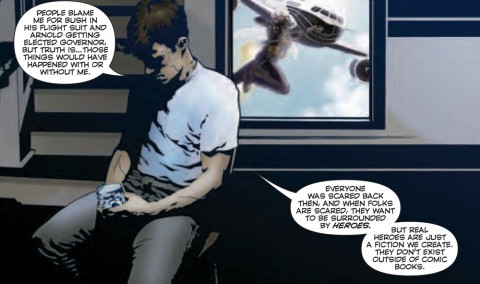
Collect: Ex Machina #1-11.
Best Character: Mitchell Hundred.
Best Line Of Dialogue/Caption: “Your security detail calls you “Superman”? I always pictured you as more of a Batman kinda guy.” – Suzanne Padilla.
Best Scene/Moment: Mitchell vs. Gay Marriage – Chapter 3.
Best Issue: Chapter 2 – State Of Emergency. This collection of Ex Machina breaks the comic down into chapters instead of issues, resulting in a far more fluid reading, just another area where this book triumphs in. Each chapter has a varying interval of issues, with Chapters 2 and 3 making up about 90% of this first volume. Chapter two deals with plenty of personal and political woes and this is absolutely where the story will hook you in. As a person stalks the snowy streets of New York, killing snow plough drivers and crippling the city’s road system, Mitchell also has to deal with the backlash of a painting that is hung in the BMA (Brooklyn Museum of Arts) that has the image of Abraham Lincoln with the “N-Word” written across it. You learn so much about Mitchell and his past during this chapter and you will quickly realize that you’ve never read a comic quite like Ex Machina.
Why You Should Read It: Ex Machina is just a brilliant piece of political superhero drama for the world to devour. It’s intelligent, witty, engaging and so many other things that I could talk about all day. It’s not the best work of Vaughan’s career, nor is it the worst, it’s just satisfying if you’re looking for something outside of the norm and bored of superhero comics by the “Big Two”. Everything that happens matters. It’s not a story where people are senselessly murdered for the sake of shock value, although that’s definitely there. It’s the story of a man’s slow demise while he’s trying to do what he thinks is best for New York City. Mitchell is a deeply conflicted character that you can’t help but fall in love with. Ex Machina is political superhero drama that carefully hides just how dark it truly is and I promise you it will be a book you simply can’t put down when you start it.
Saga Vol 1
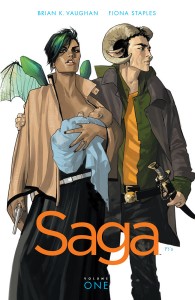 Brian K. Vaughan is a well-known writer across both the mediums of comics and television. Vaughan is most well-known for being a writer, story editor and producer on the hit television show Lost, as well as penning some of the most critically acclaimed comics to have ever been produced. With books like Y: The Last Man, Saga, The Runaways, Ex Machina, and today’s featured book, Saga, on his resume, you know Vaughan is no slouch. His style of writing is grand in scope but still remains simple and accessible for new readers, making him a perfect writer to introduce to people who are looking to get into comics for the first time and find seriously great stories whilst doing so.
Brian K. Vaughan is a well-known writer across both the mediums of comics and television. Vaughan is most well-known for being a writer, story editor and producer on the hit television show Lost, as well as penning some of the most critically acclaimed comics to have ever been produced. With books like Y: The Last Man, Saga, The Runaways, Ex Machina, and today’s featured book, Saga, on his resume, you know Vaughan is no slouch. His style of writing is grand in scope but still remains simple and accessible for new readers, making him a perfect writer to introduce to people who are looking to get into comics for the first time and find seriously great stories whilst doing so.
Saga follows the story of star-crossed lovers Alana and Marko, parents to a newborn child, fleeing for their lives in the midst of an intergalactic war. Both Alana and Marko fight for opposing sides of the war and are hunted for deserting their respective armies. The brutal war is waged between the largest planet in the galaxy, Landfall, and it’s satellite, Wreath. When the war becomes too damaging to either locations, the battles begin to get outsourced to different planets, resulting in widespread violence all throughout the galaxy. Cornered and hunted, the two lovers give birth to their child on the planet Cleave with seemingly no way to break for freedom. When they are given a map detailing the different areas of Cleave, Marko and Alana quickly realize that they may have a way to escape the planet after all. With everyone from Freelancers to members of the Robotic Empire hunting them down, the path off Cleave couldn’t be more treacherous for the new parents.
Brian K. Vaughan’s Saga is aptly named, presenting the reader with immersive worlds, fascinating characters and an epic story unlike anything ever done in comics before. From the opening issue right to the finale of this arc, every moment serves well to present exciting characters or increase the scope of this massive tale. Most people would readily compare Saga to Star Wars meets Romeo and Juliet but that comparison in my eyes just feels off. The tragic romantic elements of Romeo and Juliet are ever-present but that’s where the comparison should stop, as the story is more of a coming of age tale about experiencing parenthood with the backdrop of something similar to Star Wars in scope. To put it simply, Saga is a woefully unique comic book that can have comparisons drawn but at the end of the day, it’s its own body of work that is different from anything you’ve probably ever read.
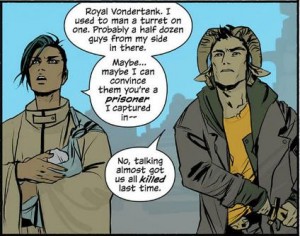 Here comes my favourite part of doing these articles: Confession Time! I first read Saga volume 1 about two to three years ago at the ripe age of twenty and hated it. I absolutely, unequivocally hated the comic. Maybe I just wanted to be that guy who hated the book everyone loved but I found the characters flat, the story dull and the world building uninteresting. A few years later and with a seemingly infinite amount of comic reading experience now under my belt, I revelled at the challenge of returning to this one comic book that I absolutely loathed, all for this weekly challenge. This right here is a post I’ve been rather excited to tackle. Not many people think about it but even as comics mature, so to do its readers. Sometimes a reader needs to catch up to a certain level of comprehension to thoroughly enjoy a comic. In this instance, I humbly acknowledge that my reasons for hating Saga now seem to be dramatically misplaced. Upon reading this book for the second time, I found so much more joy that I ever thought I would have. There’s still things I dislike about the book, but it’s now a book I’d not only readily recommend but one that I may continue on with reading. It still not anything close to as good as something like East Of West, but it is a great book that every comic reader should experience at least once.
Here comes my favourite part of doing these articles: Confession Time! I first read Saga volume 1 about two to three years ago at the ripe age of twenty and hated it. I absolutely, unequivocally hated the comic. Maybe I just wanted to be that guy who hated the book everyone loved but I found the characters flat, the story dull and the world building uninteresting. A few years later and with a seemingly infinite amount of comic reading experience now under my belt, I revelled at the challenge of returning to this one comic book that I absolutely loathed, all for this weekly challenge. This right here is a post I’ve been rather excited to tackle. Not many people think about it but even as comics mature, so to do its readers. Sometimes a reader needs to catch up to a certain level of comprehension to thoroughly enjoy a comic. In this instance, I humbly acknowledge that my reasons for hating Saga now seem to be dramatically misplaced. Upon reading this book for the second time, I found so much more joy that I ever thought I would have. There’s still things I dislike about the book, but it’s now a book I’d not only readily recommend but one that I may continue on with reading. It still not anything close to as good as something like East Of West, but it is a great book that every comic reader should experience at least once.
Brian K. Vaughan does an excellent job of easing the reader into his narrative, doing some seemingly seamless world building to truly immerse anyone along for the ride. Choosing to have the story narrated from the perspective of a newly born child is a fun little touch that is perfect for the reader, as you are introduced to this world and these characters through a character who is brand new to all these worlds themself even though they speak with a past tense, as if they’re recollecting instead of dictating. Establishing the intergalactic war as the backdrop for the story is great work by Vaughan as it gives the story a sense of scope, making it feel as though it’s all so massive that it can’t be contained to just one world or follow one set of characters.
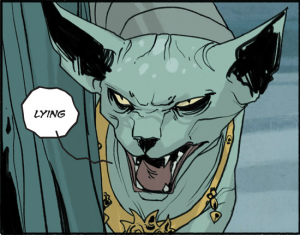
Speaking of the characters, there’s a great mix of abstract cast members who seemingly don’t fit together now, even though there is a clear plan to intersect them at some point in the distant future. The two primary characters, Alana and Marko, brilliantly contrast each other as the leads to the story, with their differing personalities complimenting each other perfectly. Alana is a hard-nosed, tough woman who seems poised to take no-nonsense. Marko is a delicate, almost monk like character, renouncing violence and having a gentle personality with a hidden, dark temper. The two new parents balance each other out in such a way that the scenes they’re in work together when they play off of each other’s weaknesses. Marko’s pledge to abstain from violence leads to some equal exciting and hilarious reactions from Alana who seems confused why he won’t use violence to even protect his new family.
Other primary characters like The Will, Prince Robot IV or even Izabel all serve to only enhance the story, even though some of their places in the overall narrative feel a little less clear than that of Marko and Alana. The Will is a Freelancer, a hired gun tasked with the job of killing Marko and Alana but keeping their child alive. With his ally, the Lying Cat, The Will seems almost like a classic style of anti-hero, doing heroic things whilst still being an awful man. His intentions are good even if his methods are flawed, making him an immediately likable and interesting character. Prince Robot IV is another character who has a clear arc in place but it feels uncertain how he’ll factor into the long run of things. His father, the royal King of sorts, tasks IV with the job of capturing Marko and Alana as well, giving him a clear connection to the title characters. Vaughan adds layer to the character through subtle dialogue in the story, implying that IV has a form of PTSD following a two year tour in the intergalactic war. The stakes become personal for IV late in the first arc, giving him ample motivation to find the deserters and return home as soon as possible. Izabel becomes an unlikely ally to Marko and Alana, aiding them in their search for a way off the planet Cleave. Izabel is a character you can sympathize with easily due to the tragic nature of who she is, yet again she is another character who is closely tied to the leads but doesn’t have as obvious of a long-term direction. These are just a few characters sprinkled throughout Saga that give the story a great amount of depth.
Like I mentioned earlier in this post, although Saga has finally won me over, there are still some parts of it that I have trouble with, with the primary one being the dialogue. I found that even after a second reading, there were as many bits of solid work with the dialogue as there were parts that made me groan. For the most part is just boiled down to some of the ridiculous things some of the characters would say that just felt like they didn’t suit the moment. Vaughan has characters say things that are meant to lighten the mood from time to time but there are more than a few instances where, in my eyes, they fall flat. But then again, there are some moments where it works brilliantly and comes at the perfect moment. Even as I complain about the low parts of the dialogue, I have to highlight the high parts as well, like how Vaughan makes understanding the purpose of the story or who characters are incredibly easy. There’s something just accessible about how Vaughan tells the story through the dialogue of characters that you’re reading and it’s so nice to see in a comic market that struggles to find the balance between holding the reader’s hand and giving them freedom to engage their mind. With Saga, Brian K. Vaughan seems to find the near perfect balance of both and that might be why this comic works, even if it starts working for you years after you thought it would.
Collects: Saga #1-6.
Best Character: The Will.
Best Line(s) Of Dialogue/Caption: “This is how an idea become real. But ideas are a fragile thing. Most don’t live long outside of the ether from which they were pulled, kicking and screaming. That’s why people create with someone else. Two minds can sometimes improve the odds of an idea’s survival…but there are no guarantees.” – Hazel.
Best Scene/Moment: Marko makes a meaningful sacrifice for the future and Alana has a perfect rebuttal – Issue 6.
Best Issue: Issue 1. This is a bit of a no brainer really. Issue 1 could be about as close to a perfect first issue as you’ll find in comes today. It introduces you to the characters, the story, does a good bit of world building and has plenty of exciting moments mixed in. Everywhere you look in this issue there are just perfect examples of how to do the art form of comics justice.
Why You Should Read It: Brian K. Vaughan crafts an intergalactic saga with Saga and it’s something everyone should enjoy at least once. It’s a story about love, growing up, being uncomfortable, and making sacrifices. It’s hard to place in just one genre since it’s about love as much as it is about action, adventure, and mystery. You should read Saga because it takes the best parts of what make comics great and does it all so well. Take it from a guy who thought this was the worst comic on the planet three years ago, the story will win you over one way or another at some point. Better just to bite the bullet now and enjoy it while you can as it really is an exquisite body of work from Brian K. Vaughan.

